Blog
Asus Zenbook S 16 review: Fantastic design backed by powerful Ryzen AI processing

Why you can trust TechRadar
We spend hours testing every product or service we review, so you can be sure you’re buying the best. Find out more about how we test.
Asus Zenbook S 16: Two-minute review
The Asus Zenbook laptop line has long been one of my favorites, sitting among the best ultrabooks alongside rivals like Dell’s XPS series and the LG Gram collection. Now, Asus has given its premium laptop lineup a fresh lease on life, thanks to AMD’s mighty new Ryzen AI chips and the magic of something called ‘ceraluminum’.
I’ll get further into that mysterious new material further down in this review, but here’s the short version: the lid of the new Asus Zenbook S 16 is made from a futuristic composite of aluminum and ceramic, giving it a soft matte feel while also being more durable, lighter, and fingerprint-resistant than the traditional aluminum and plastic used in the construction of most modern laptops.
Of course, a fancy outer casing doesn’t guarantee you’re getting a high-quality product. But the Zenbook S 16 delivers a premium experience in other areas too, with great performance across a variety of workloads and a generally very comfortable user experience.
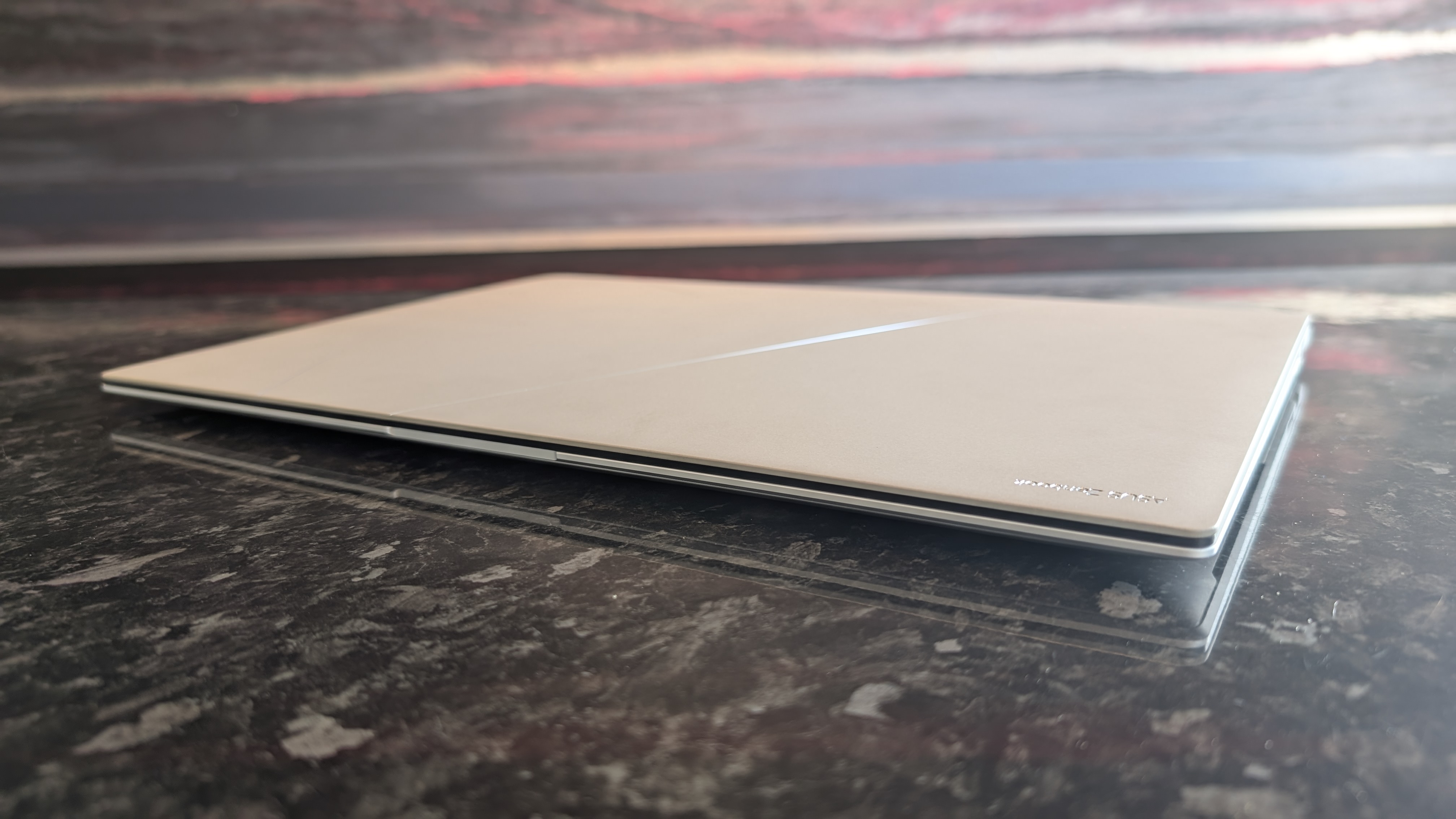
Although I always spend at least a full workweek using any laptop I review in lieu of my regular daily driver (the ever-faithful HP Spectre x360), I was actually forced to use this laptop for a few days. See, my boiler needed replacing, and unfortunately, it’s situated in my home office – meaning that for two days, I was jettisoned from my desktop setup to the breakfast bar downstairs while the installation engineer resolved my lack of hot water.
I’ll be the first to admit that I’m a creature of habit, and was initially unhappy to be displaced from my usual workstation. But honestly, I’m beginning to wonder if I shouldn’t drop Asus a line politely asking (read: begging) to keep this Zenbook. The 16-inch OLED touchscreen is gorgeous, and the large touchpad and keyboard make for a very comfortable user experience. It’s perhaps the closest I’ve felt to using a MacBook Pro while actually on a Windows laptop – and while I’m a known macOS hater, I’ve always maintained that Apple’s Mac products are very well-designed devices.
Starting at $1,599 / £1,499 / AU$2,999, the Zenbook S 16 isn’t exactly cheap, but for that price tag, you’re getting some pretty impressive performance and a really, really nice piece of physical hardware. I’ll dig into the details more in the Price and Availability section, but the key takeaway here is that the value proposition is solid.
There’s only one real drawback here, in my opinion: the battery life. It’s perfectly serviceable, don’t get me wrong, but it’s nothing spectacular within the current market space. Still, it’ll last you through a full day’s work and then some – so as long as you don’t mind putting it on charge overnight.
Asus Zenbook S 16: Price and availability
- How much does it cost? Starts at $1,599 / £1,599 / AU$2,999
- When is it available? Available now
- Where can you get it? Available in the US, UK, and Australia
With a price tag starting at $1,599 / £1,499 / AU$2,999, the Asus Zenbook S 16 certainly leans towards the premium end of the market, but you’re getting plenty of bang for your buck here.
There are a few different configurations, with the main difference being the Ryzen processor model and the amount of RAM. Every model comes with the same 3K OLED display and 1TB of storage – a 2TB model would’ve been nice, but at least the SSD is user-upgradable. The base configuration, priced as above, comes with a Ryzen AI 7 350 chip and 24GB of RAM (an unusual amount, but still better than the more commonplace 16GB industry standard).
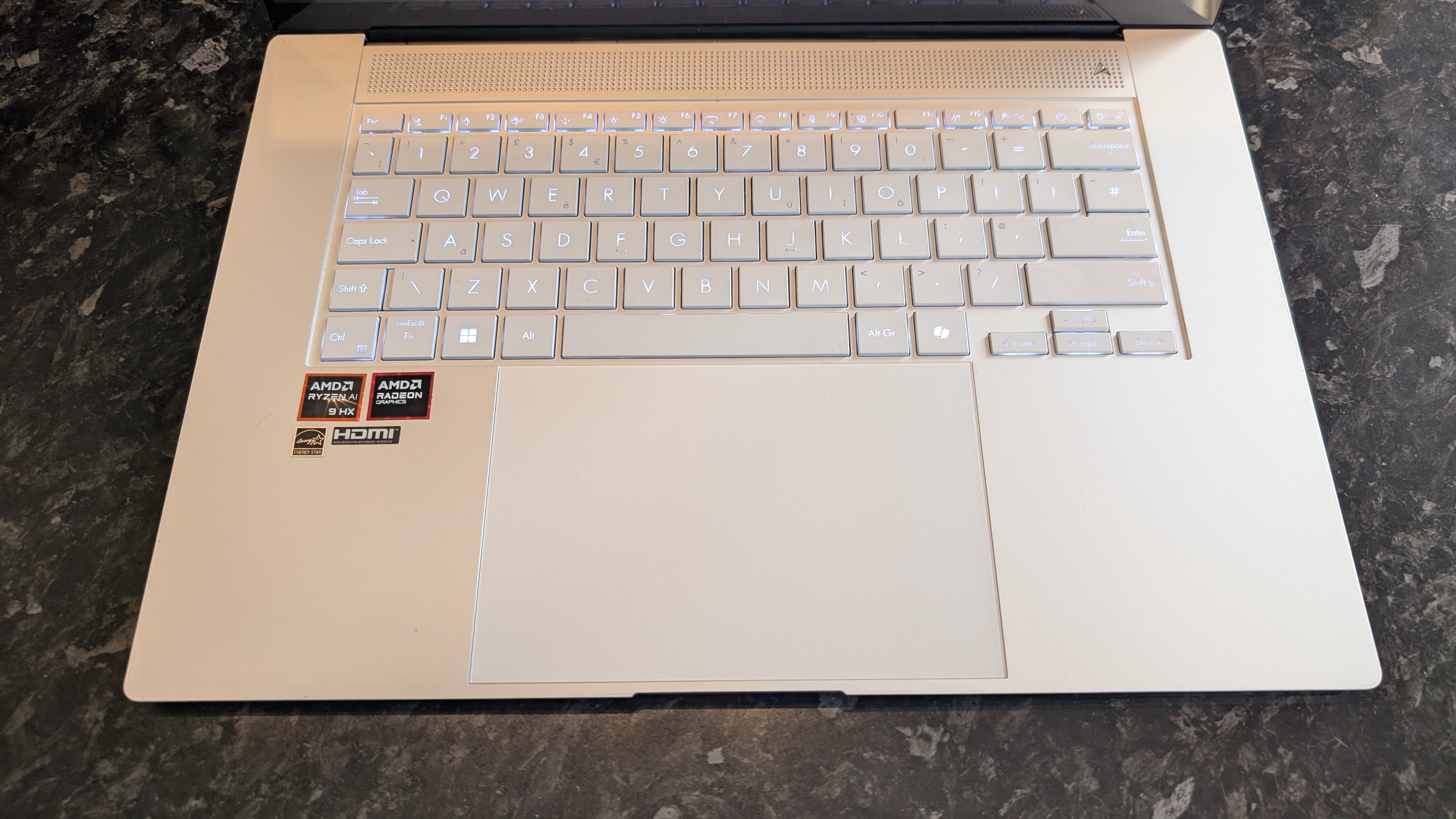
My review unit is a higher-end model, featuring a Ryzen AI 9 HX 370 processor and 32GB of RAM, and it will cost you $1,799 / £1,599 – and at the time of writing, this model unfortunately isn’t available in Australia. I say ‘unfortunately’ here because for my money, that extra $200 / £100 is well worth it for the internal hardware upgrade.
For comparison, a 16-inch MacBook Pro will cost you $2,499 / £2,499 / AU$3,999 – and that’s just for the base M4 Pro model. Granted, there’s no denying that Apple’s pro-grade laptop can offer better performance in many areas than this Zenbook, but the point stands that the Zenbook S 16 is very good value for money.
Asus Zenbook S 16: Specs
| Header Cell – Column 0 | Asus Zenbook S 16 |
|---|---|
CPU | Up to AMD Ryzen AI 9 HX 370 |
GPU | Up to AMD Radeon 890M |
RAM | Up to 32GB LPDDR5X |
Display | 16-inch 3K (2880 x 1800) OLED, 120Hz |
Storage | Up to 1TB SSD |
Ports | 2x Thunderbolt 4 USB-C, 1x USB 3.2 Type-A, 1x HDMI 2.1, 1x SD card reader, 1x 3,5mm combi audio jack |
Wireless | Wi-Fi 7, Bluetooth 5.4 |
Weight | 1.5kg / 3.31lbs |
Dimension | 35.4 x 24.3 x 1.29cm / 13.9 x 9.6 x 0.51 inches |
Asus Zenbook S 16: Design
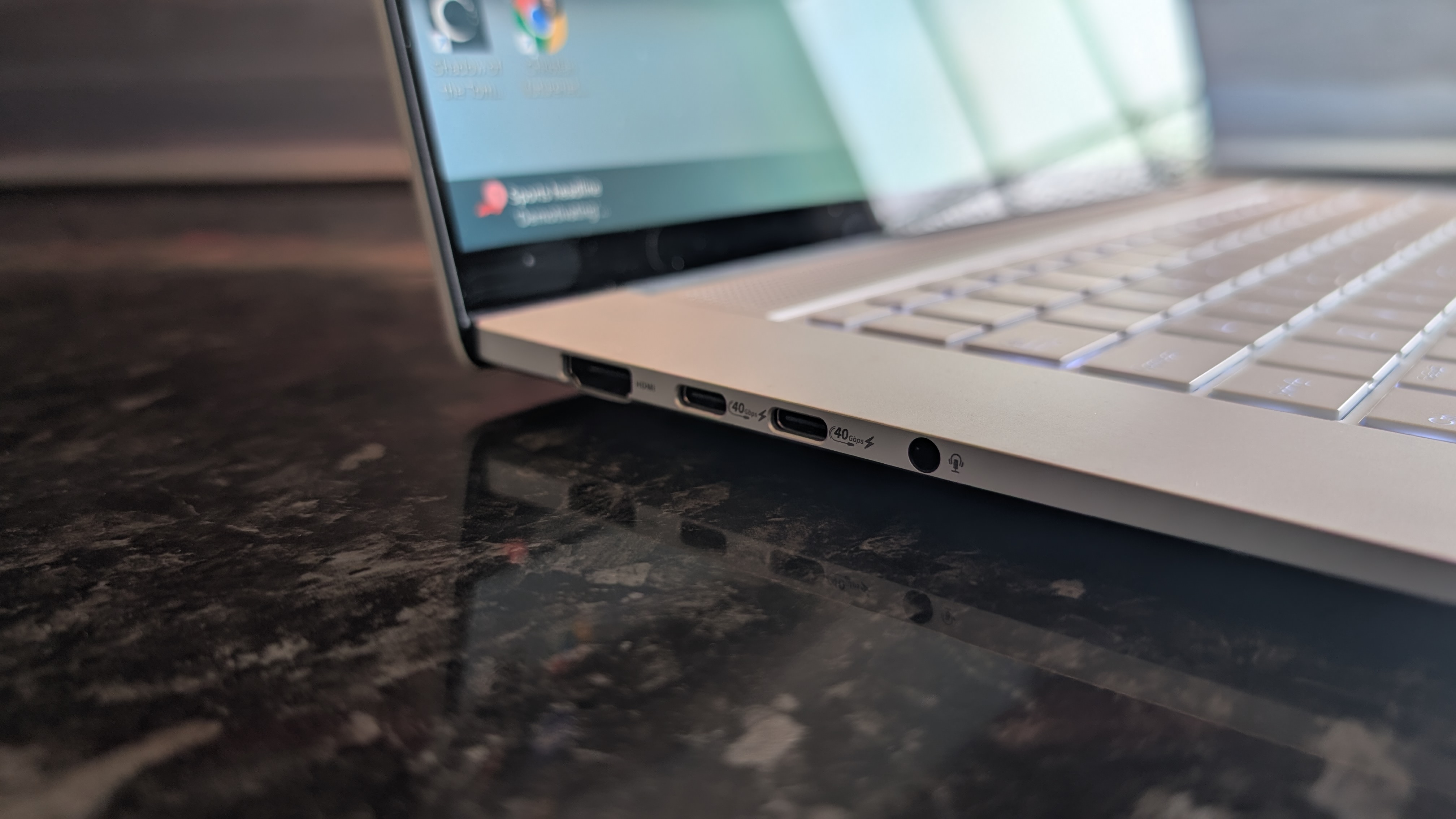
- Super comfortable keyboard and trackpad
- Ceraluminum casing is impressive
- Surprisingly lightweight
Aesthetically speaking, this is undeniably one gorgeous laptop. With the ‘Scandinavian White’ colorway, it feels as clean and striking as any of the best laptops. The back of the screen is not only made from Asus’s fancy ceraluminum material, but it also has a kintsugi-inspired pattern of sharp lines inlaid in silver, which strikes the perfect balance between eye-catching and minimalist.
A little more about that revolutionary new material, though: you can read about my first time encountering ceraluminum right here, but I’ll give you a quick breakdown in case you don’t feel like reading a whole different article. It’s created by electrochemically bonding aluminum with a ceramic component, producing a strong plated material with a matte surface that feels like unglazed pottery to the touch.
The best thing about this is that it brings the lightweight, durable nature of aluminum – a popular choice among manufacturers when it comes to laptop construction – while also providing a grippier surface that is more resilient against both damage and smudging from fingerprints. I’ve criticized more than a few laptops over the years for being ‘fingerprint magnets’, and happily that doesn’t apply here. The whole thing feels impressively sturdy despite being very thin and light for a 16-inch laptop.
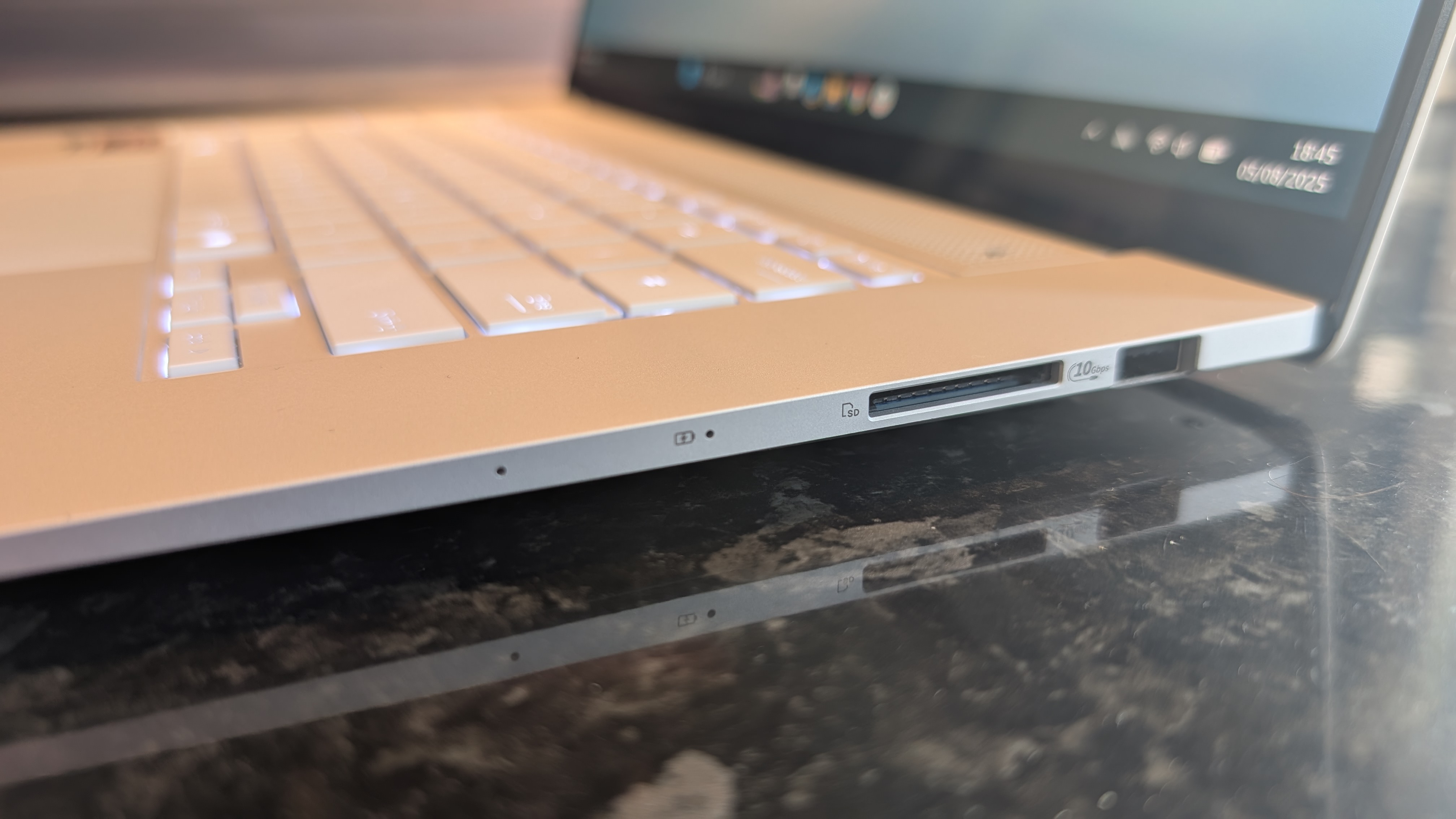
Opening up the lid, you’re met with a more conventionally constructed aluminum keyboard housing, with a large glass touchpad and nicely spaced keys that make it very comfortable to type on. I also found the touchpad to be sensitive and responsive, with a firm click, although I typically prefer to connect a wireless mouse when using laptops.
Above the keyboard, a wide cooling grille sits with a subtle Asus logo in the corner. The keys are backlit with white LEDs, which can be set to three different brightness levels; it’s not often I take much time to comment on keyboard backlighting, but the Zenbook S 16’s is particularly vibrant.
Speaking of vibrancy, the display on this laptop is fantastic, offering rich color and sharp contrast thanks to its 3K OLED panel. While the maximum brightness isn’t quite as high as I’ve seen on some other OLED laptops, it’s certainly bright enough to use in well-lit environments, and it’s also a touchscreen. Somewhat surprisingly, this display has a 120Hz refresh rate, a pleasing upgrade from the 60Hz panels you see on most non-gaming laptops.
In terms of physical connectivity, we’ve got a good selection of ports here, including USB-C, USB-A, HDMI, and even an SD card reader – the latter of which may be a boon for photographers when combined with the excellent display. Lastly, the speakers are quite good, providing detailed audio for both music and dialogue – it’s perhaps lacking a tiny bit of kick in the bass department compared to some laptops I’ve seen, but overall I really can’t complain about the speaker quality.
Asus Zenbook S 16: Performance
- Solid all-rounder performance
- NPU provides support for AI features in Windows
- Playing games is certainly an option, though it’s no gaming laptop
The AMD Ryzen AI 9 HX 370 is a powerful chip backed with 32GB of RAM in my review unit, and I’m pleased to say it performs admirably. General responsiveness is great and everyday tasks run smoothly, to the point where anyone who just wants a laptop for office work could probably consider downgrading to a Ryzen AI 7 model.
When it comes to more demanding workloads, the Zenbook S 16 offers good performance across a variety of areas, including 3D rendering, AI functionality, and gaming. Sure, it’s not going to beat out an actual gaming laptop with a dedicated GPU, but the AMD Radeon 890M integrated graphics are surprisingly competent even in more demanding games, provided you’re willing to dial back the graphical settings a bit and turn on AMD’s FSR 3.0 resolution upscaling mode.
Asus Zenbook S 16 review: Benchmarks
Here’s how the Asus Zenbook S 16 (AMD Ryzen AI 9 HX 370) performed in our suite of benchmark tests:
3DMark: Night Raid: 34,618; Fire Strike: 8,516; Time Spy: 4,407; Steel Nomad: 889
Cinebench R23: Multi-core: 13,441; Single-core: 1,953
Geekbench 6.4: Multicore: 14,102; Single-core: 2,845
Geekbench AI: Single Precision Score: 2,359; Half Precision Score: 1,217; Quantized Score: 4,811
PCMark 10: 6,827
Crossmark: Overall: 1,744; Productivity: 1,637; Creativity: 1,940; Responsiveness: 1,537
Sid Meier’s Civilization VII: (1080p, Medium, No Upscaling): 45fps; (1800p, High, No Upscaling): 16fps; (1800p, High, Balanced FSR 3 Upscaling): 22fps
Cyberpunk 2077: (1080p, Medium, No Upscaling): 22fps; (1800p, Ultra, No Upscaling): 6fps; (1800p, Ultra, Balanced FSR 3 Upscaling): 10fps
Battery Life (TechRadar movie test): 14 hours, 55 minutes
In real-world testing, I had no issues whatsoever with the performance of the Zenbook S 16. Running Spotify in the background while working across 20+ open Chrome tabs didn’t cause the slightest bit of slowdown, and image editing in GIMP 3.0 was smooth and effective – a far cry from the rather sluggish experience I get when trying to edit images on my usual laptop.
AI performance is also reasonably good; again, you’re ideally going to want to spring for a laptop with a dedicated Nvidia GPU if you want to be running serious AI workloads locally, like producing your own language models, but for running the local aspects of something like Microsoft’s Copilot+ AI assistant, the average user will have no problems.
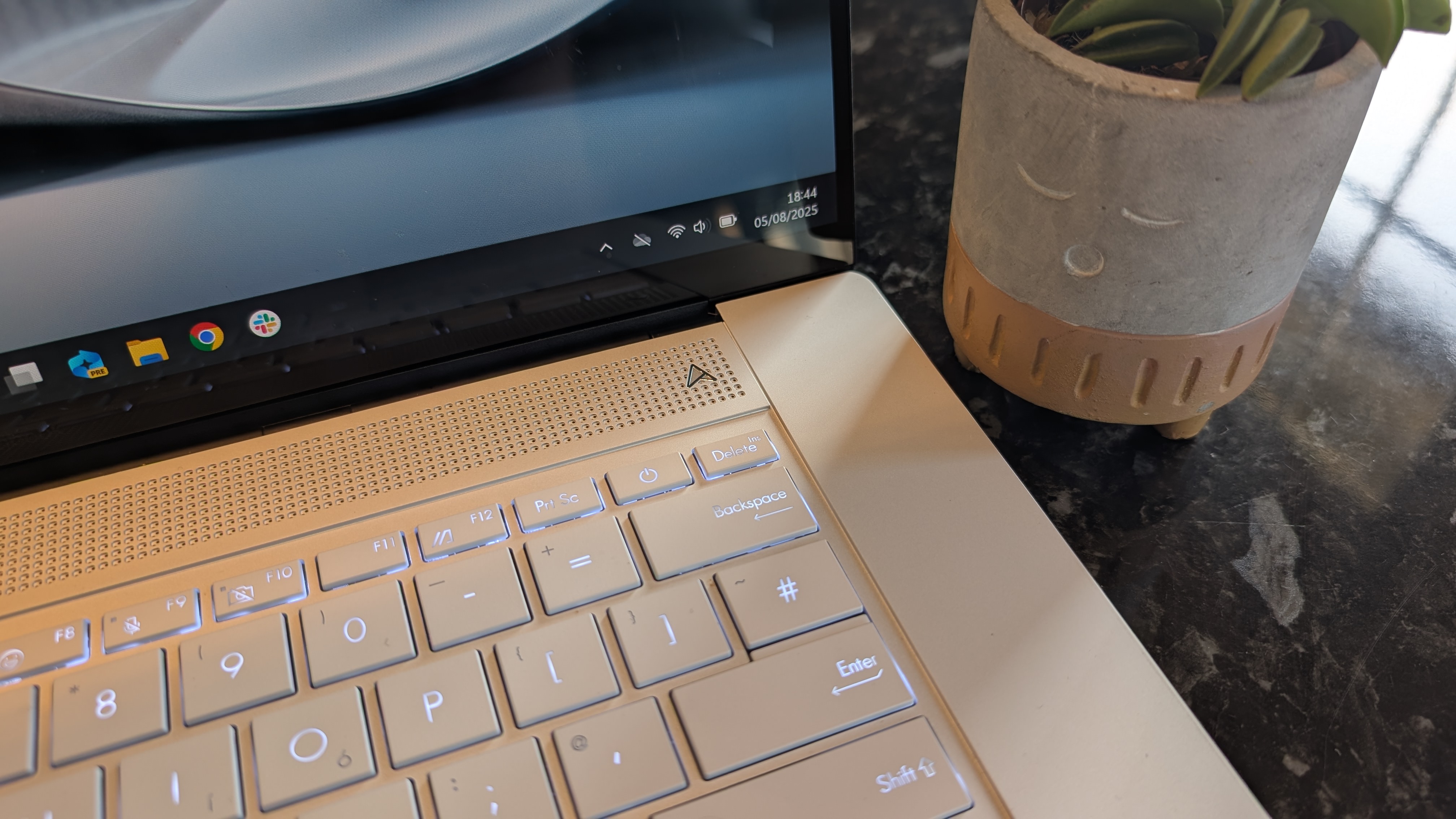
To dig into that gaming performance a little more (there’s overlap here with other 3D rendering and modeling software), I needed to drop the resolution to FHD+ rather than the native 3K and enable AMD’s FSR 3 upscaling to make most games playable – this machine isn’t coming close to any of the best gaming laptops – but for anyone who just wants to play casual titles or indie games on their off-time, the Zenbook S 16 is more capable than I had expected. I used it for a spot of Stardew Valley after work on multiple occasions, which unsurprisingly ran great.
In Civilization VII, I was easily able to get a decent framerate at 1200p, while the infamously hardware-demanding Cyberpunk 2077 was completely unplayable at native 1800p but produced an fps of 35 at 1200p with Low settings and FSR 3’s Performance mode enabled (and frankly, even with those settings, this game still looks bloody fantastic). It’s a true testament to the power of AMD’s resolution upscaling tech for integrated GPUs; I’m quietly awed by the fact that a game like Cyberpunk is playable at all on an ultrabook like this.
I will note that the fans on the Zenbook S 16 get a tad noisy when you’re running more intensive software – it’s nothing too onerous, and I found it ran quietly during regular tasks like web browsing, but be aware that you might want headphones to play games on it. It’s worth adding that the laptop didn’t get uncomfortably hot at any point (aside from directly on the vent above the keyboard), even during stress testing.
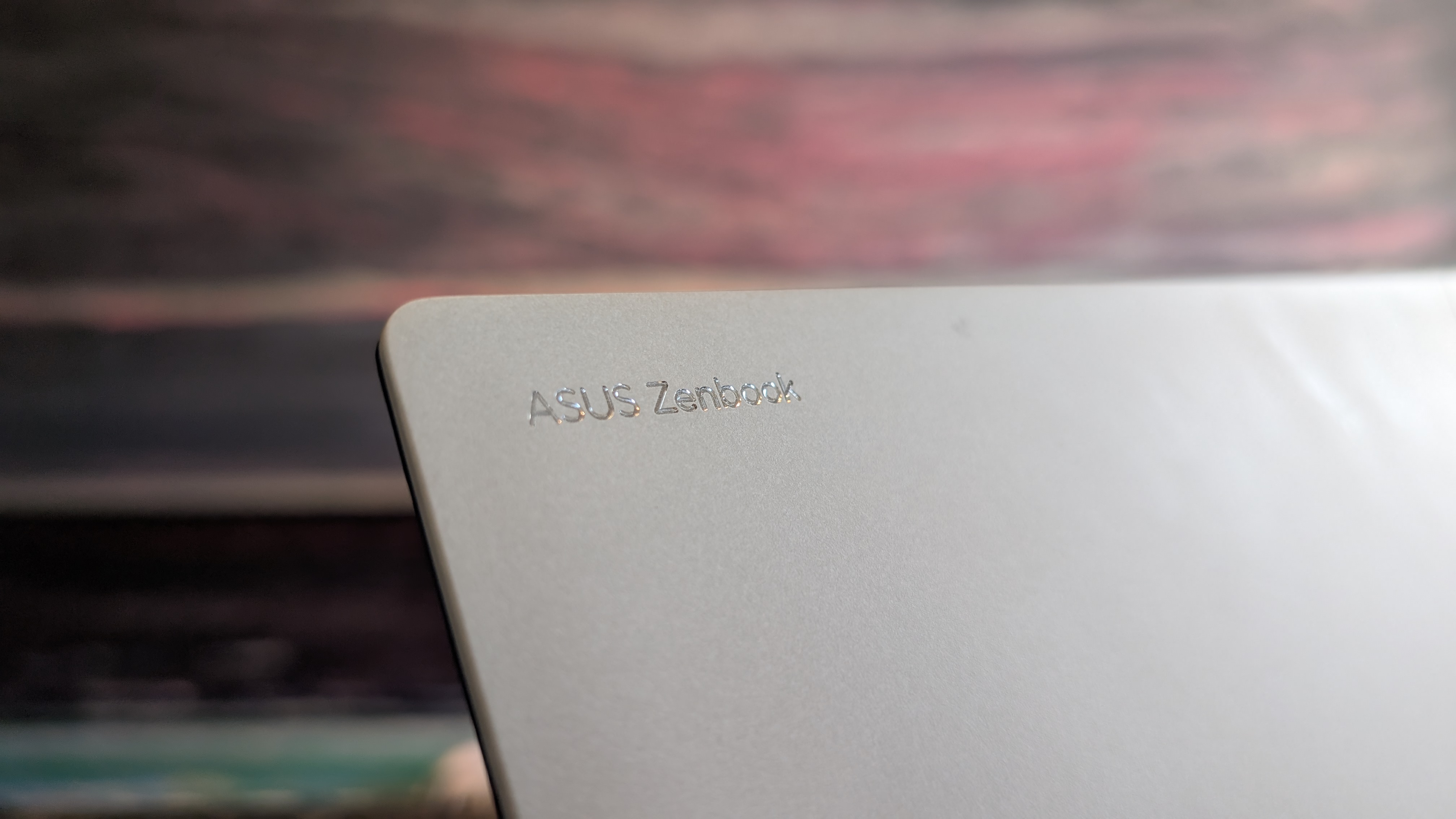
Asus Zenbook S 16: Battery
The battery life on the Zenbook S 16 is pretty good. That’s almost all I can really say about it; it’s not mind-blowing, beaten out by several competitors, but it’s still sufficient for a full day’s work (or two) without needing to plug in provided you turn off the keyboard backlight and don’t work at maximum brightness.
In our battery life test, which involves running a looped video file at 50% brightness, the Zenbook S 16 ran out of juice just shy of the 15-hour mark, which for a 16-inch OLED laptop is respectable, if unspectacular. In real-world use situations, I was getting between 10 and 12 hours out of it at a time on average, and it holds its charge remarkably well when not in use.
Since it charges via USB-C, you can easily make use of other charging cables, though the supplied 65W adapter provides fast-charging capabilities that provide 50% battery charge in a little over half an hour.
Should you buy the Asus Zenbook S 16?
| Header Cell – Column 0 | Notes | Rating |
|---|---|---|
Value | It’s no budget machine, but the price-to-performance ratio here is great. | 4.5/5 |
Design | A stylish and robust design combined with a comfortable user experience makes for a truly premium-feeling laptop. | 5/5 |
Performance | Performance is solid across productivity, creative, and gaming workloads, with good responsiveness and fans that only kick in when you’re running demanding programs. | 4.5/5 |
Battery | The battery can comfortably run for more than an 8-hour workday, though it is beaten out by some competing laptops. | 4/5 |
Total | While the pre-installed Asus software is a bit annoying, this is a fantastic laptop that delivers a great aesthetic and strong performance at a sensible price point. | 4.5/5 |
Buy it if…
Don’t buy it if…
Also Consider
How I tested the Asus Zenbook S 16
- Replaced my regular laptop with the Zenbook S 16 for several weeks
- Used the laptop both for day-to-day work and personal projects
- Ran it through our full suite of benchmarks, plus some extra tests
As is typical for my laptop review process, I swapped out my daily driver for the Asus Zenbook S 16 – and actually ended up liking it so much that I kept using it after my usual week or two of real-world testing. Asus, if I could keep this one, that would be great…
This involved all my day-to-day work, which is mostly emailing, word processing, web research, and image editing, plus some work on personal projects and a bit of gaming in my off hours. I also ran our suite of benchmarking and battery tests to provide a clearer image of the Zenbook S 16’s overall performance.
Read more about how we test
First reviewed July 2025












